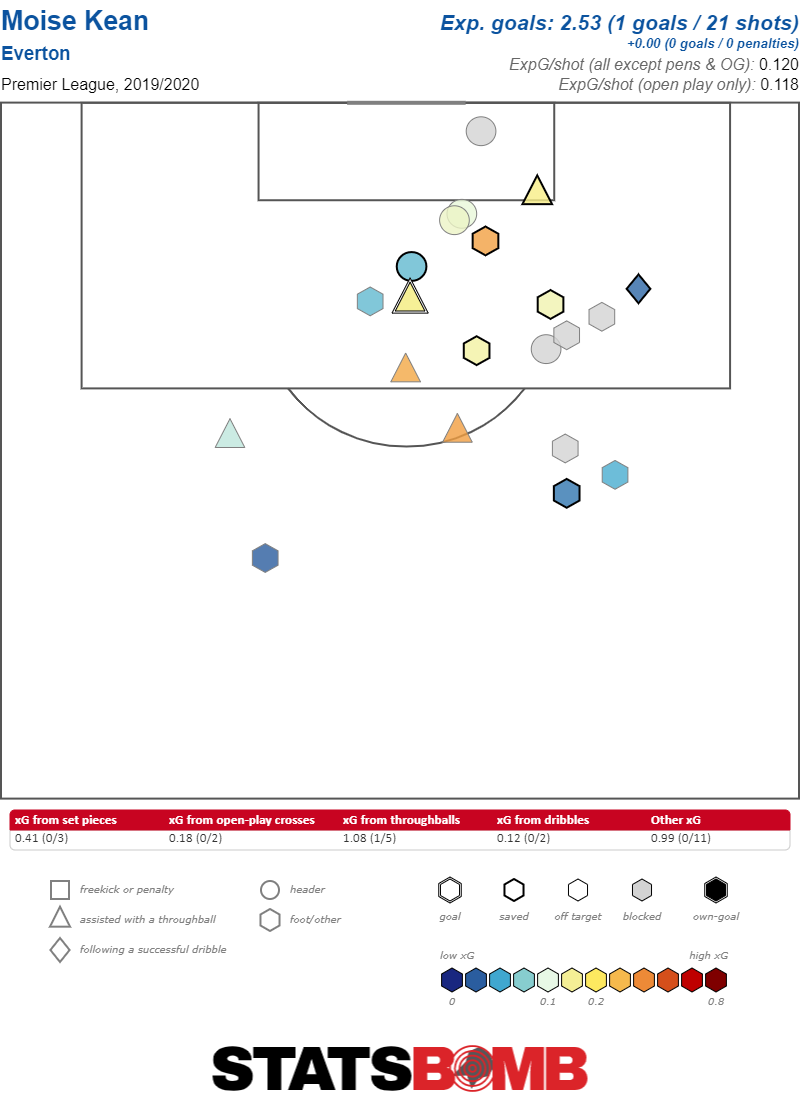This May will mark seven years since Manchester United last won the Premier League title. And it is unlikely they will hold up the trophy anytime soon, either.
It’s a familiar story at this point. Upon Sir Alex Ferguson’s retirement in 2013, United made a whole host of bad decisions, blowing a fortune on the wrong players and having them coached by the wrong managers. Ole Gunnar Solskjær’s gang are just the latest iteration of how they continue to relieve the same ugly chapter.
Currently fifth in the table, the underlying numbers show a modest improvement, but nothing drastic. An expected goal difference per game of +0.55 is an entirely respectable fourth-best in the division, with a fairly supercharged Leicester season keeping them out of the Champions League places.
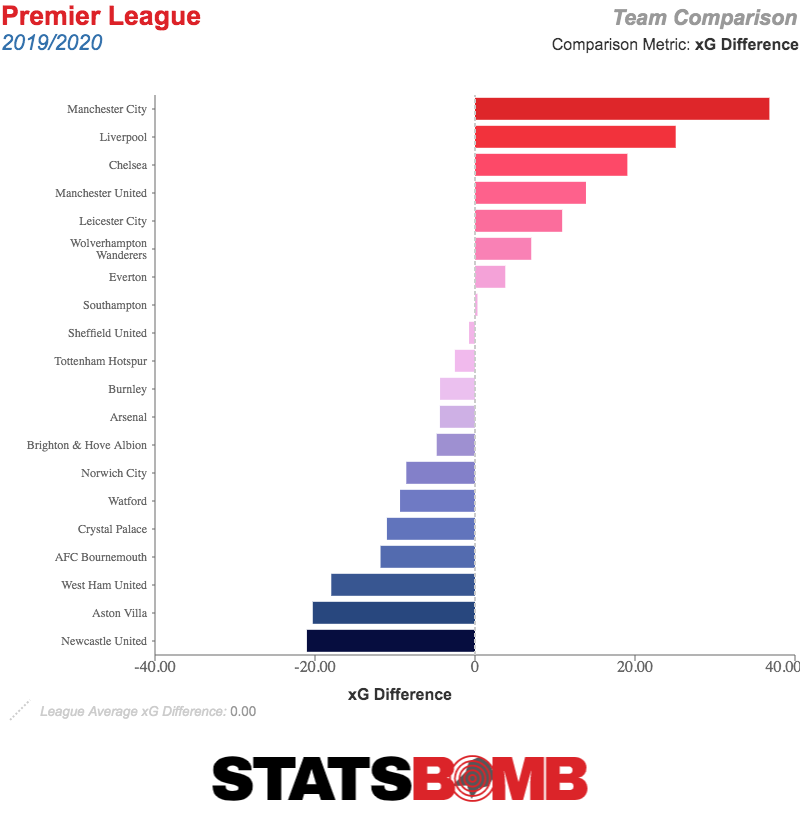
It’s on the defensive end where their real strength lies. United are a good shot suppressing side, with their 10.22 conceded per game the fourth-best in England’s top flight. They combine this with a solid xG per shot conceded of 0.10, the sixth-best in the league and better than the other top shot suppressors. United are not supremely talented at any one aspect of defending, but the strong performance across the board makes them a tough side for any opponent to break down.
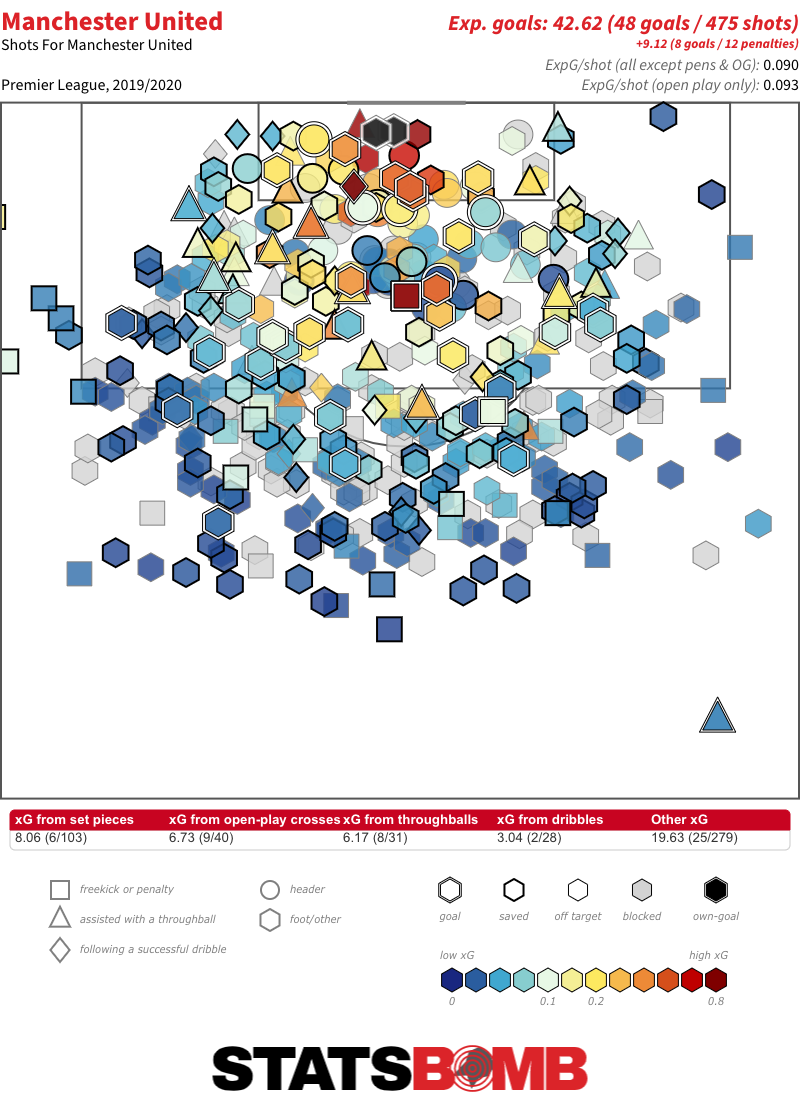
This represents a genuine improvement—and a necessary one— as United no longer have their defensive cheat code. In many of the dark post-Ferguson years, David De Gea almost single-handedly kept his team afloat. His decline has been exaggerated by some, but it’s been a while since he’s performed many heroic feats. He’s looked a smidgen above average this season, and with the difficulty in finding long-term repeatability in xG overperformance, United probably shouldn’t bank on him saving them a significant number of goals going forward.
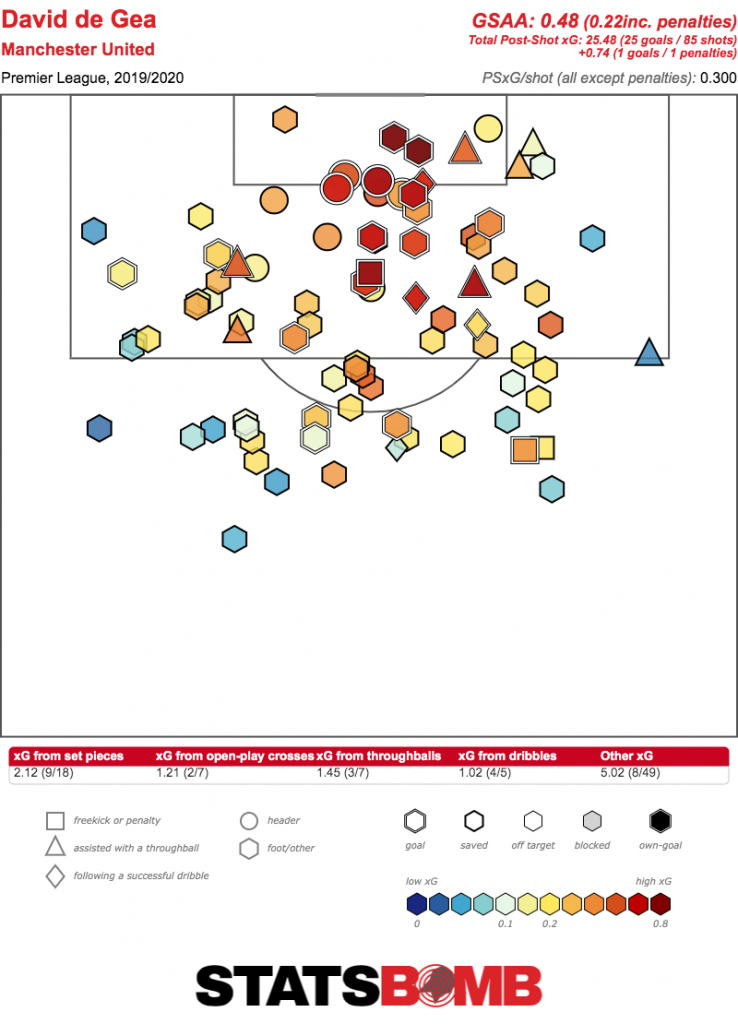
United's defensive solidity has come at the cost of the attack just kind of . . . being there. Their1.26 xG per game is almost exactly the league average. Both their shot volume and quality are fairly mediocre. It’s all very whatever.
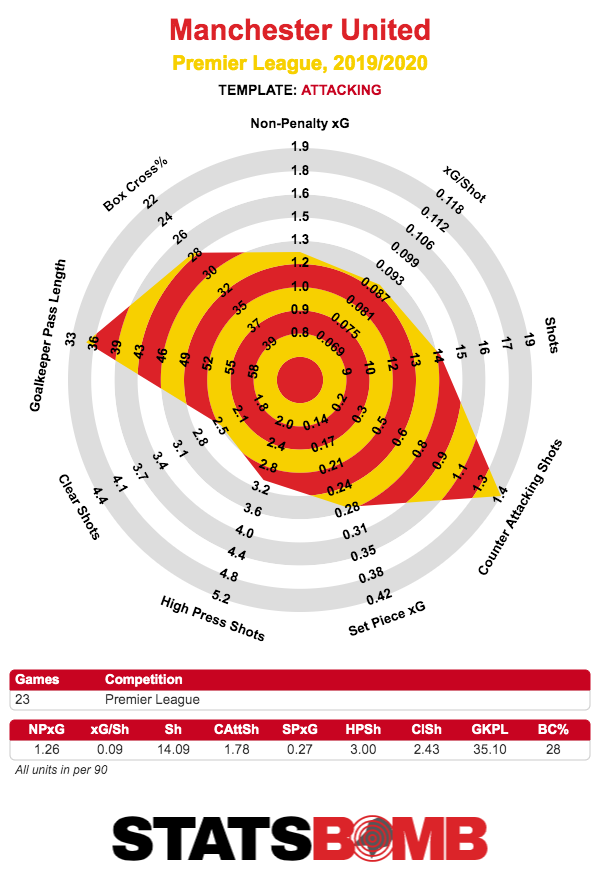
The one area where they do clearly excel is in counter-attacking shots. This intuitively makes sense given what we see on the pitch. United’s primary attacking weapons are Marcus Rashford, Anthony Martial and Daniel James, while Jesse Lingard and Mason Greenwood have also stepped in this season. All primarily want to run into open space on the counter rather than build in possession in front of a deep block. A significant part of the side’s disappointing performances is that they don’t have obvious answers when denied the space to launch counter-attacks.
Perhaps surprisingly, Rashford is their primary creator in the final third. He leads the side in open play passes into the box per 90, well ahead of fellow attackers Martial and James, despite not being primarily thought of as a “passer”. That he’s added this to his game recently, in addition to his decent scoring and dribbling threat (as seen below), is impressive, especially given the underlying mediocrity of the team's attack. It’s so frustrating that he's now out injured, given he looks on the cusp of making the leap to being a genuine star.
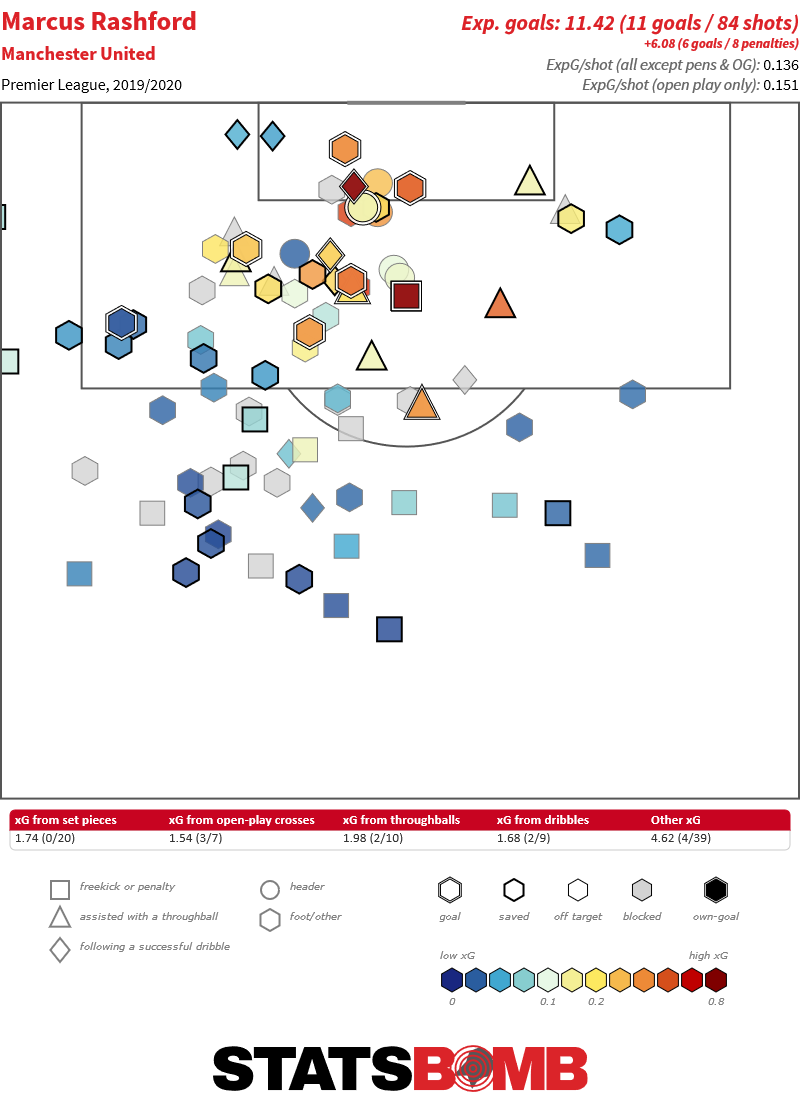
Some might point out that Liverpool also have three attackers who primarily want to counter into open space, and they would be correct. Mohamed Salah, Sadio Mané and Roberto Firmino certainly thrive in counter opportunities much more so than when forced to break down a deep block. Jurgen Klopp’s side, though, have two critical advantages over United. The first is an expertly drilled counter-pressing situation aimed at forcing such opportunities rather than waiting for them to come naturally. The other is their use of the fullbacks as additional playmakers in wide areas, stretching the play and forcing opponents out of a narrow shape with their crossing threat. At right-back, United have Aaron Wan-Bissaka, a defender with a superb ability to shut down opposition wingers but real limitations in possession. He’s better at many things than his Liverpool counterpart Trent Alexander-Arnold, but there’s a humongous gap in quality on the ball when breaking down sides. On the other side, Luke Shaw isn’t incapable, but he lacks both the athleticism and technique that Andy Robertson possesses (Brandon Williams has shown some promise, but at this point nothing more than that). Solskjær’s side do not have the option of creating for their attackers through the fullbacks.
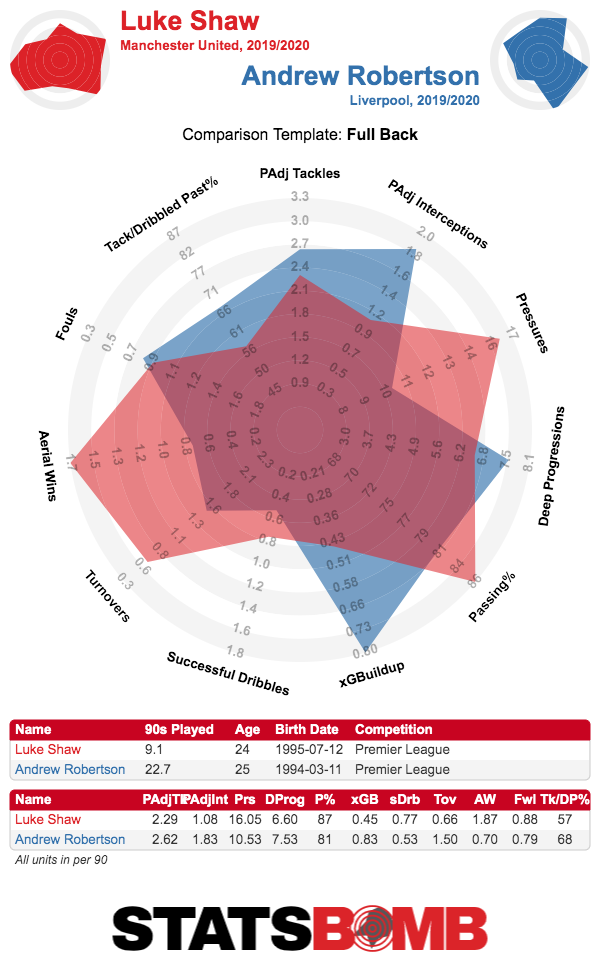
If creating for the attackers through the fullbacks is not a viable option, the work must come from the midfield. Let’s start with the elephant in the room. Paul Pogba has not played a lot of football for United this season and it seems possible that he won’t ever again do so. This would be a great shame, as Pogba is the only midfielder at the club with genuine vision and a consistent ability to move the ball forward into dangerous areas. In his brief appearances this year, mostly early in the season, he’s shown this, unlike everyone else at the club.

After Pogba, United’s player second in deep progressions per 90 is Fred. Yes, Fred is, in Pogba’s absence, the player most responsible for moving the ball into the final third for this team. Next is Ashley Young, but he's now at Inter Milan. It is obvious to pretty much everyone that these players are not the playmakers a club needs to compete at the highest level. This club just does not have playmakers in the side. There are many ways for a team to build well in possession and create opportunities, but no coach has yet devised a system that can consistently create dangerous chances without anyone who’s good on the ball.
This is, first and formost, a squad construction problem. At the very least, no one at the club seems to be under the illusion that this is a squad capable of challenging for major titles, or will be any time soon. After a number of big-name, high-price signings brought in under David Moyes, Louis van Gaal and José Mourinho, the club seem to have accepted that targeting mostly younger players who fit their desired style of football is a much more sustainable model. While none could be dubbed a huge success so far, the summer 2019 signings James, Wan-Bissaka and Harry Maguire have all broadly done what they were bought to do, and by this club’s recent standards that’s a big success. United do have a plan, and seem intent on sticking with it. That’s a marked change from 2013–18.
Having a plan is the first step, and it’s a big one. But the next step is having the expertise to execute it. United need to target and acquire the right younger players capable of high tempo attacking football. That their summer signings consisted of the highest-profile English centre-back, the most promising young right-back in last season’s Premier League not named Alexander-Arnold, and a young winger coached at the international level by Ryan Giggs does not suggest a great reservoir of knowledge lurking within their recruitment setup. The next challenge is to take these players and coach them into a proactive style that fits into the fast-paced, Ferguson-esque mould but who is capable of breaking down the many teams who will sit deep and allow United to keep possession. Solskjær has the aforementioned squad limitations to deal with, but even in their best performances, his side have played reactive, counter-attacking football all season. There has yet to be real evidence of a plan while in possession.
There are any number of talented people working in recruitment at football clubs who would jump at the chance to transform United's process. On the manager side, Mauricio Pochettino is currently sitting at home, while almost any manager not currently in an elite job would be interested in the challenge, prestige and salary delivered by Old Trafford. It’s not that Solskjær is doing a bad job, per se. It’s just that there’s no obvious reason to think he can build the side the club need to challenge for titles again. United are currently looking like a competent side, which seems like a miracle compared to recent years, but it’s still well short of what they need to get back to the top.
Stats of Interest
Sticking with Manchester United for a moment, it’s now been over a year since Jesse Lingard last scored a Premier League goal. Considering he did not previously have a reputation for poor finishing, this seems like a bad streak that should come to an end sooner or later.
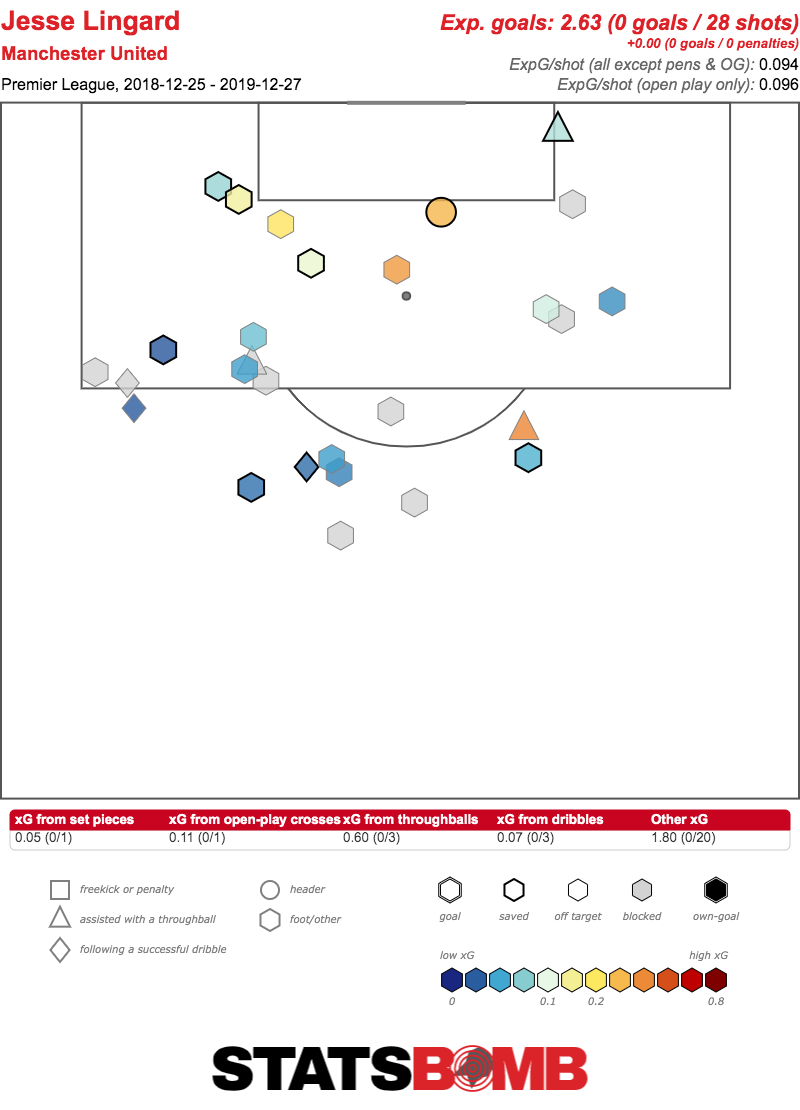
Alisson became the first goalkeeper this season to earn an assist at the weekend, and on his first key pass of the campaign. But he’s not the most creative goalkeeper in the league. That honour falls to Nick Pope, with 4 key passes adding up to 0.55 xG assisted this season. We all knew Burnley were direct, but using the goalkeeper as an actual attacking weapon like this is quite something.
Moise Kean finally got off the mark for Everton last night. It’s been a tough start for him in England, made all the more frustrating by some poor finishing from reasonable production. The goal is overdue, but it may signal the moment when he really kicks on.
